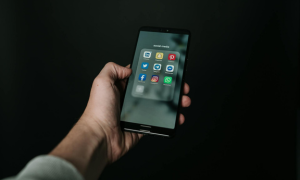
Jul 16 2024.
views 151The days of calling up the old gang for lunch, chatting it up with your girlfriends as you pull out a tacky dress from the hangers at a mall, or sharing a laugh at the movies together, are slowly growing dim and reaching twilight. Nowadays for most, these moments only reside in memories or are only part of an episode in Friends.

In 2021, the term “friendship recession” was introduced when researchers noticed a decline in the number of social circles since 1990. 12% of Americans reported having no close friends and particularly affected were 18 - 24 year old women. A similar trend was seen worldwide when Sapien’s Labs’ Mental State Of The World published a report in 2022 observing participants from 64 countries and discovered that their ability to maintain meaningful friendships and connections had plummeted in the past 12 months - once again between young people. Our little island is no different when it comes to social isolation, as a good amount of the youth of Sri Lanka seems to be struggling to make friends and maintain them.
“It’s not just about going to Colombo City Centre and posing with a drink in your hand with your best friend to post on Instagram. It’s about who’s there to sit with you through the good, the bad and the ugly. And for most of us, that number is a whopping one or two, if you’re lucky” a university student shares.
With the soaring economic costs that are coercing people to work longer hours or scramble for a side hustle, along with a capitalist society that inordinately focuses on individual success, long-lived friendships are out of reach and new friendships are dumped on the back burner. An increasing number of people moving to a new location in search of work, education or for personal reasons is also a common cause of fading friendships as maintaining close connections can be challenging over distance. It seems that there is only so much a video call can do to help keep in contact as relying on digital communication has been seen to influence the quality of friendships.

Social isolation statistics saw a new high when the pandemic hit and strict quarantine laws were introduced. Data from the International Journal of Environmental Research and Public Health shows that severe loneliness was recorded at 21% during COVID-19, with 13% reporting a substantial increase in isolation. Support networks began to shrink and anyone who wasn’t considered your immediate family was just another contact on your phone that popped up occasionally. Moreover, starting afresh in university or at a new job wasn’t providing the same opportunities necessary to build connections and grow friendships as lectures and meetings on Zoom were the only scheduled events.
The rise in flying solo
A common belief seems to be that activities that were once considered social can now be accomplished alone, efficiently and conveniently. Instead of tagging along with your friends for a shopping trip, it’s a lot easier and faster to purchase items online. Many claim that by the time a date when everyone is available has been arranged, the task could already have been completed without any added hassle.
As people became more aware of time management and setting boundaries during the pandemic, saying “no'' slowly became the norm. Whether it was passing up a get-together invite or attending an old classmate’s wedding; hiding behind a simple text and declining offers was becoming a lot easier, inevitably leaving people devoid of a healthy amount of social interaction. Despite living in an era equipped with technology to connect to the other side of the world in the blink of an eye, a loneliness epidemic now continues to prevail.

Comments shared on a popular online discussion platform called 'Reddit,' specifically on the online community dedicated to Sri Lanka (r/srilanka subreddit), provide an insight into how the pandemic has affected their personal friendships:
“The pandemic brought about significant changes afterwards, without a doubt. As for my friendships, not much has changed. I have a small group of friends - we stay connected through WhatsApp and meet up every couple of months, which works well for us. However, I’ve noticed that since the pandemic, many people have been preferring solitude over socialising, including myself.”
“It’s a huge change, inflation hit shortly after COVID-19 and the steep decline in our country’s economy was mostly to blame.”
“Most friends don’t even have the time to say hello. They nod their heads when we meet and that’s the most social interaction available, thanks to the new busy lifestyle.”
“Pre-Covid, my dad drove us around in his car, but we had to sell it to make ends meet. That may have added to the issue of not being able to go out at all post-Covid. At most, I’d be able to go out with my friends once a month if things are good. I’d ask my friends if we could budget the hangouts in a way where I could afford it with the limited funds I had - other times we’d hang out at each other’s houses. Since that can’t be an everyday thing and it is hard to adjust to, I’d video call them. That’s the best I could do to keep my friendships intact so to speak. Two of my friends also study abroad, so the video calls became something that we grew used to.”
“It drastically changed my social life. We used to go for drinks every week, breakfast and lunch tables were full of friends and colleagues, trips every 6 months with different friend groups. It all changed. Now we have several Whatsapp groups so we can share memes.”
The impact of isolation on health
The consequences of isolation are a lot more than just feeling blue about not having anyone to drink with on Friday night, though. Recent research has linked isolation and loneliness to higher risks for a variety of physical and mental conditions, including high blood pressure, heart disease, obesity, a weakened immune system, anxiety, depression and even death.
Introvert or not, humans are social animals that are hardwired to live in communities. Losing that sense of connection changes our perception of the world and paints it in a dull shade of grey. Chronic loneliness can trigger a biological defence mechanism in us, as the body feels threatened and experiences mental distress. Steve Cole, the director of the Social Genomics Core Laboratory at the University of California, claims that loneliness acts as a fertiliser for other diseases and promotes several types of wear and tear on the body. “The biology of loneliness can accelerate the buildup of plaque in the arteries, help cancer cells grow and spread and promote inflammation in the brain leading to Alzheimer’s disease,” he states.
If you’re looking for a sign to rekindle a friendship or dive into a new one - this is it.
The good news? Enjoying time with friends doesn’t always have to run your pockets dry. Dedicating a weekend to visit that one lake from your childhood together or gathering up your pals for a potluck picnic provides the perfect opportunity to spend quality time, reminisce memories or make new ones. Keep an eye out for a hobby club or class that meets regularly to meet like-minded people and share stories with one another.
Many long-lasting friendships are built on exchanging insight and wisdom through experiences. These conversations don’t always have to be in-depth, but can also be about what your silly orange cat was up to this morning. A little sharing goes a long way, and as a favoured novel character, Anne Shirley noted, “True friends are always together in spirit”.
0 Comments